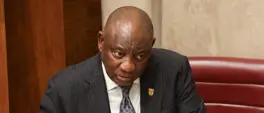MALAIKA MAHLATSI | How a landmark ConCourt ruling got lost in 'foreigners will take our surnames' noise
Malaika Mahlatsi
19 September 2025 | 12:20"The ruling undermines heteropatriarchal norms that have come to shape our society and asks existential questions that must compel us to re-think identity, heritage and the very nature of who we are," writes Mahlatsi.

Picture: ROBSON JUNIOR from Pixabay
On the 11th of September 2025, the Constitutional Court of South Africa ruled that men have the right to adopt their wives' surnames, declaring the relevant sections of the Births and Deaths Registration Act unconstitutional for unfairly discriminating on the grounds of gender.
This landmark decision, in the case of Jordaan v Minister of Home Affairs, invalidates the law that limited surname choices after marriage. Previously, the law allowed women to automatically assume their husband's surnames but required men (and same-sex spouses) to go through a more complex process – one that often ended in refusal.
In a victory for two couples who brought the case, the Constitutional Court ruled that the law amounted to gender-based discrimination. Henry van der Merwe was denied the right to take the surname of his wife, Jana Jordaan, while Andreas Nicolas Bornman could not hyphenate his surname to include Donnelly, the surname of his wife, Jess Donnelly-Bornman.
The two couples had argued that the law was archaic and patriarchal, and violated equality rights enshrinedin the constitution that South Africa adopted at the end of apartheid in 1994. Although they had successfully challenged the law in a lower court, they went further to ask the Constitutional Court to confirm its ruling.
And while the ruling applies immediately, parliament will now have to amend the Births and Deaths Registration Act, along with its regulations, for the ruling to take effect.
The ruling is one of the most significant legislative advances of the democratic dispensation, with practical implications that go beyond simply the choice for men to assume the surnames of their spouses.
It is a law that strikes at the heart of patriarchy and challenges colonial norms that our society has accepted as natural. In reaction to the ruling, many people, including political parties, argued that this decision undermines African traditions and culture.
But this argument, when stripped of emotions and engaged factually, is not only flawed butit also reflects the extent to which colonial logic has embedded itself in the psyche of the colonised.
This is because, as the Constitutional Court correctly argued, surnames are a “colonial import”. They are a product of administrative control rather than biology or heritage.
In Europe, the concept of surnames did not exist until the late 16th century when the Westphalian model of the sovereign state (and the church) was consolidated. At the time, most people in Europe were known by a single name which was sometimes combined with a patronymic. In most cases, names were combined with descriptions of occupations and geographies of origin.
Thus, someone would be known simply as Peter (single name), Peter son of William or Peter William’s son (patronymic), Peter the Smith (occupation) or Peter of the Hill (geography, as in, Peter who lives by the hill).
As the power of the state grew and states became strongly organised, they needed to develop a mechanism to tax, conscript, and govern their populations.
The solution was the mandatory, hereditary surname. Then, the Council of Trent, an ecumenical council of the Roman Catholic Church held in three sessions from 1545 to 1563, mandated that Catholic parishes maintain rigorous baptismal registers, compelling the standard recording of family names.
This facilitated a continent-wide system of registration that aligned with the states’ objectives. This model would later be exported to African colonies, where, too, they were an administrative imposition.
Thus, the idea propagated by some that the ConCourt ruling “undermines African heritage and traditions” is rooted in historical revisionism.
Husbands allowed to use wives' surnames legally, rules ConCourt
Attorney unpacks ConCourt ruling on husbands taking wives’ surnames
A more dangerous reaction to the ruling has also been propagated by some commentators such Nthabeleng Likotsi, described in the media as “South Africa’s first female bank owner”.
The reality, however, is that Likotsi is a controversial character who is currently under investigation by the South African Reserve Bank for claims that she may have provided false or misleading information during the application of YWBN Mutual Bank.
This is a criminal offense. In 2021, the Companies and Intellectual Property Commission Tribunal ruled that YWBN had failed to follow rules under the Co-operatives Act and ordered the return of funds to investors. But I digress.
In a statement published by IOL, Likotsi argued: “Now all these illegal foreigners who marry South African women are going to assume the woman’s surname”, and lamented that this could lead to a loss of identity and ancestral ties for families.
Her sentiments have been echoed across social media, which is to be expected given the growing anti-immigrant sentiment that has taken root in our country
Likotsi, and many who reason like her, have failed to engage with the ConCourt ruling at an advanced reasoning level that reflects on its implications for gender relations, which are power relations.
The ruling undermines heteropatriarchal norms that have come to shape our society and asks existential questions that must compel us to re-think identity, heritage and the very nature of who we are.
Additionally, it advances the core struggle for the feminist movement – that of fashioning a world in which men, women and non-binary people operate from the same set of rules as opposed to rules applying for men to the disadvantage of other genders. One does not have to agree fully with the ruling to appreciate its importance and profundity.
I, for one, do not support the idea of spouses changing surnames or even using a double-barrel.
I deem the exchange of surnames as a continuation of the compromise of dentity for an institution that should simultaneously provide for partnership and individuality regardless of whether it is men or women making the compromise.
Nonetheless, I appreciate the ruling for how it levels the playing field, which provides a foundation from which society can build onto the necessary debate about whether marriage should translate to morphed identities.
By reducing the ruling to a diatribe against foreign nationals, we have simultaneously lost the opportunity to apply ourselves intellectually to its implications and affirmed the dangerous idea that foreign nationals are inherently problematic and parasitic.
This characterisation is at the heart of the criminalisation and dehumanisation of foreign nationals who are consistently scapegoated for the governance and economic failures that South Africa is experiencing.
I have argued many times, and contributed to scholarship on the question, that our country does not have a “migrant problem” but rather, a colonialand leadership problem.
This is true of many other African countries where, too, the spectre of Afrophobia overshadows efforts to develop economies, unite nations and create meaningful collaborations that would facilitate auto-centric development geared towards an African agenda led by Africans.
The obsession of many South Africans with scapegoating foreign nationals is a metastatic cancer that erodes our capacity to reason and to think critically.
We are so consumed by “these illegal foreigners” as Likotsi puts it that we cannot even begin to apply ourselves and think about how we can transform our country’s rich diversity from a threat to an instrument for progress.
Progressive developed countries around the world are engaging in discourse around how to maximise the opportunities provided by societies being transformed by immigration, and finding ways to provide support for the integration of migrants.
They understand what many South Africans do not – that migrants, both documented and undocumented (NOT illegal as this criminalises people rather than focus on the legal aspect of their status) have the potential to contribute meaningfully to economic, social, cultural and political development.
Until we move away from the scapegoating, criminalisation, dehumanisation, de-civilisation and problematisation of foreign nationals, particularly those from the continent and the African diaspora, we will continue to miss opportunities to recognise progress being made to protect and advance civil liberties that have benefit for our collective futures.
Malaika is a geographer (with expertise in urban geography and water resource governance) and researcher at the Institute for Pan African Thought and Conversation. She is a PhD in Geography candidate at the University of Bayreuth in Germany.
Get the whole picture 💡
Take a look at the topic timeline for all related articles.
















